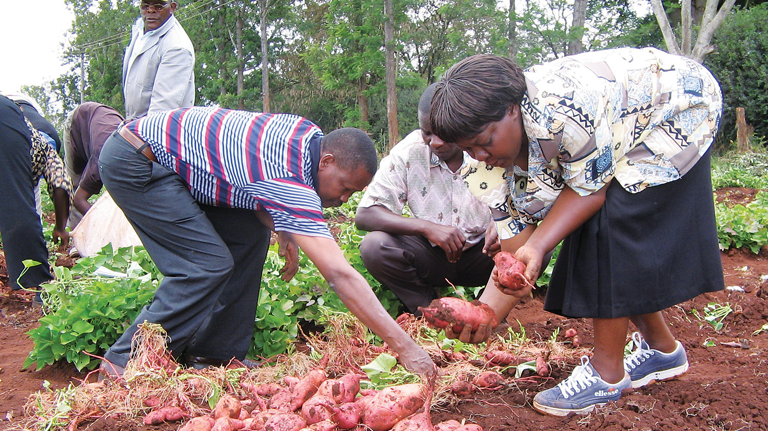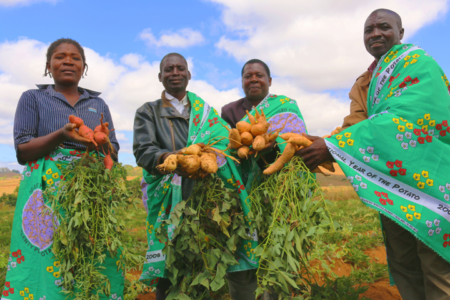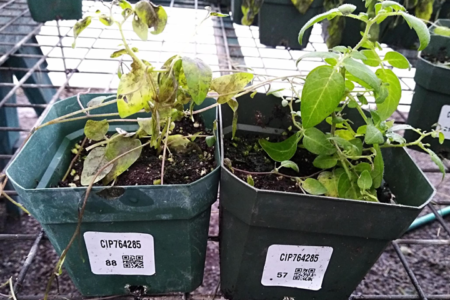
Sweetpotato-based job-opportunities for young people
This project takes a novel approach to enhancing food security and incomes by focusing on employment opportunities. Through learning about growing, multiplying and processing orange-fleshed sweetpotato, young people in northern Mozambique will acquire the knowledge and skills to build sustainable livelihoods and contribute to food security and nutrition in their communities.
Background
Mozambique faces numerous challenges, including food insecurity, malnutrition, and high youth unemployment. Nationally, more than 40% of children under five years are stunted and 50% of the population lives below the poverty line. Agriculture is the main source of income, but unemployment is high at around 27%, with an even greater proportion of young people struggling to find jobs. High unemployment is a key driver of out-migration, which leads to general decline in the economies of rural areas.
Sweetpotato production, consumption and processing offer opportunities to improve food and nutrition security, as well as generate employment opportunities in Mozambique. The crop is highly efficient in transforming water into calories, has a short maturity period, and can be harvested during the ‘hunger months’ before the cereals ripen. Orange-fleshed sweetpotato also provides a rich source of vitamin A, with a small plot of just 500 m2 meeting the daily dietary requirements of a family of five. Vitamin A deficiency is a key contributor to child undernourishment; it limits growth, weakens immunity, affects eyesight and increases mortality.
Many families however lack access to quality sweetpotato planting materials, particularly high-yielding, orangefleshed varieties. Linking investment in agriculture to youth employment has dual benefits in terms of increased livelihood opportunities and supply of more nutritious food, as well as making agriculture an attractive business for all.
Objectives
- Help reduce poverty and build food and nutrition security of the target beneficiaries through the creation of employment and increased participation in sweetpotato value chains.
Approach
The project builds incomes by creating employment opportunities for 750 young people and increased knowledge and skills in agriculture. It targets young people in two districts in northern Mozambique. Participants engage in seed multiplication, root production and processing activities. They receive training on sustainable agricultural practices, business management skills and marketing strategies. The whole community benefits from enhanced access to good quality planting materials of orange-fleshed sweetpotato.
The project particularly targets young women, with a goal of 50% women engaged in the vine multiplication and sweetpotato production activities, and 100% women in the processing training. Participation by young women builds their capacity in production, processing and marketing, and enhances their self-confidence, empowering them to engage in family and community decision-making. Participants also receive training in Triple S: an approach in which sweetpotatoes are stored in sand during the dry season and planted in seedbeds 6-8 weeks before the rainy season to produce vines for planting when the rains begin. It enables farmers to harvest earlier in the year, when food is scarce and market prices are high.
Approach
Three groups of youth activities have been established around the main components of the sweetpotato value chain, i.e. seed multiplication, sweetpotato production, and processing. Two hectares of land was made available to 68 young people, who received training on irrigation and agronomic techniques for the production of quality planting materials. In their first season, two of the seven groups harvested 2,500 kg, of which part was sold for USD 300 and the remainder consumed in their family homes. In addition, three groups sold sweetpotato vines to NGOs which distribute them to other farmers in the area. Overall, 26,000 kg of high-quality orange-fleshed sweetpotato were produced and sold for USD 2,100, enough to distribute to 3,250 families.
Around a quarter of the planting materials was sold to the second group for root production. In subsequent years, the groups will be encouraged to develop their own marketing systems, creating livelihood opportunities and disseminating the planting materials to the wider community. The root production group will learn about good agricultural practices, planting techniques, postharvest management and storage, and root and vine conservation. They produce sweetpotatoes on 10 hectares, selling one quarter of the harvest to the processing group, acquiring useful knowledge in good agricultural practices and business management. The processing group, mainly comprising women, learn how to make sweetpotato puree, a starting point for further processing. They also receive training in food technology and safety, packaging, branding and marketing.
It is expected that young people in the area will have better knowledge of sustainable agriculture, nutrition, processing and marketing, leading to increased employment opportunities. Neighboring communities will also benefit from enhanced access to quality orange-fleshed sweetpotato planting materials, with positive impacts on household food security and nutrition. With a ‘ready-made’ system of supplying planting materials and processing the harvest, the project has great potential to extend these benefits to additional communities and contribute to the economic development of the entire region.
Key outputs
| Key outcomes | Targets | Reached April 2019 |
| N°. of farmers achieving 90% net profit for root production from use of Triple S PLUS by 2022 | 150 | 68 |
| % of target farmers in areas with extended dry season using Triple S | 600 | |
| % of target farmers achieving 30% increase in sweetpotato yields | 5,250 | 3,250 |
Contact
Temesgen Bocher
CIP, Mozambique
t.bocher@cgiar.org
Thanks to our donors



